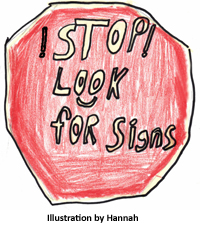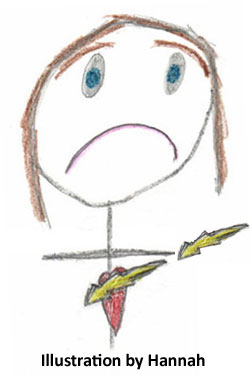
In my post last week, Supporting a Grieving Child: Listen, we discovered that there are times when it is so important to remain silent and give a child time and space to share his story of what is going on in his life during a time of grief. One of the main things that being silent and “Listening” accomplishes is that it builds a trusting relationship between the child and the adult; one in which the child begins to feel safe to share his feelings without being judged.
Today, I want to list another way in this series of how to support a grieving child and that is: Look for the Signs. By that I mean, look for signs that suggests the child is not acting in accordance with his normal behavior.
I’d like to begin by quoting Linda Goldman, professional grief therapist and counselor:
“The adult world often judges and labels children negatively for their behaviors. Many of our children are often labeled ADD or ADHD, “slow learners” or troublemakers – – and when they spiral down far enough, they are then criminalized, hospitalized, or buried.”
Linda goes on to say that this is happening because “the adult world does not recognize the signs of grief in a child. If we did, then we could help them before their pleas turn into screams and before the screams are forever silenced.”
Wow! What a thought provoking statement coming from a professional grief therapist. As a former school teacher, I confess that I sent kids to the principal’s office for punishment many times only to discover that this little “troublemaker” in my class was going through a very difficult time in his life at the time.
Let me clarify 2 important points before going any further:
- Perhaps Linda Goldman would agree with me that there are definitely situations when a child has been accurately diagnosed as being ADD or ADHD. But, what her statement strongly suggests to me is the importance of parents, educators, or any adult associated with a child to share with one another noticeable changes in behavior. This could be a strong force in differentiating between ADD, ADHD, troublemakers, and grief.
- May I hasten to point out also that not all “troublemakers” or kids with behavioral problems is a result of grief. It is what many of us in the “olden days” were taken out behind the barn and given a paddling for – – plain old disobedience. (But that is a completely different story) I might add that, in my children’s workbook, I discuss healthy ways for children to respond, even in grief.
Having said all of that, let’s proceed with our topic today: Changes in normal behavior.
Look for the Signs:
Changes in Normal Behavior
- Not eating well
- Trouble sleeping or having nightmares
- Bed-wetting
- Become withdrawn and unsociable
- Not completing schoolwork
- Problems listening and concentrating on school work
- Bursts of anger in the form of hitting and punching others
- Difficulty in following directions
- Acting out as the class clown to draw attention to himself
- Stop participating in activities he normally enjoys
- Physical Changes: It is true that grief sometimes brings with it stomach aches, headaches, or other tension related symptoms in the child’s body. However, if these physical pains persist, it is best to have them checked out by a doctor rather than assuming it is all grief related.
This list, coming from the professionals who deal with children in grief on a daily basis, just further confirms to me that lay people, such as parents, grandparents, school officials, children’s pastors, or any caring adult can get involved in supporting a grieving child by first being aware of some of the signs to look for.
Psalm 127:3 says: “Children are a heritage of the Lord.” My friend, God has given us a treasure when He gave us children.
“Wouldn’t it just thrill you to know that you have been an instrument God
has used to help a child before they spiral downward far enough
that they are criminalized, hospitalized, or buried,” as Linda Goldman stated.
**********
Thanks for joining Hannah and me this week. Next week we will continue this series on ways to Support a Grieving Child. In the meantime, in the comment section, list any changes in normal behavior you might have witnessed from a child in your life.
One last thing, would you please allow me to send a short message to Hannah, my granddaughter and illustrator: “Hannah, I am so proud of you and I am so glad you are on this journey with me! You, too, are helping Hurting Children by faithfully helping your Nana get the message out each week.”
“High Five to You!”












